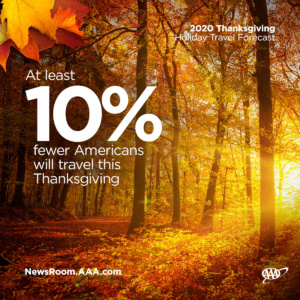BOISE – It’s a sign of the times – AAA projects that the number of Thanksgiving travelers will be reduced by at least ten percent this year due to the effects of the pandemic. That’s the lowest travel volume since the Great Recession, and the end of 11 straight years of travel growth for the holiday weekend. The Thanksgiving holiday period is defined as the five days from Wednesday, November 25 to Sunday, November 29.

While many Americans may have the disposable income for a holiday getaway, consumer confidence is in limbo, and travel restrictions or health and safety concerns will discourage a large number from doing so. AAA reminds travelers that staying home and avoiding large-group gatherings is the best way to prevent the spread of sickness. Those who make the very personal decision to travel should exercise special caution.
“Conditions are changing rapidly, so we would expect most Thanksgiving travel this year to involve shorter distances and the flexibility that you get with a last-minute road trip,” says Matthew Conde, public affairs director for AAA Idaho. “A common theme will be ‘wait and see,’ but some people who have been separated from family for months will decide that this is the time to get together.”
By the numbers
Based on mid-October data, AAA would have expected a ten percent decrease in travel, with 50 million Americans taking a trip for turkey and all the trimmings this year and 266,000 Idahoans among them. But a recent rise in the number of COVID-19 cases means that the actual turnout could be even lower.
“Last year, 89 percent of travelers made a Thanksgiving journey by car, but this year, it will be closer to 95 percent,” Conde said. “That means that the airports won’t be nearly as crowded, but the roads could still be busy at times, particularly on Tuesday afternoon when holiday travelers co-mingle with commuters during the evening rush hour.”
Thanksgiving air travel will be down by nearly half from previous years. But during the pandemic, airlines have also scaled back the number of available seats. Passengers who wait until the last minute to book a flight could face limited selection or expensive prices for the few remaining seats.
Most Americans plan to skip other modes of travel during the holiday weekend. The cruise industry remains closed, and just 353,000 people are expected to travel by bus or train for the holiday – a decrease of nearly 76 percent.
On the road
Before setting out, review AAA’s COVID-19 information for the latest updates on restrictions in the areas you’ll be visiting and passing through.
Drivers should plan their meals and rest breaks ahead of time. Some rest areas may be closed, and dine-in options could be greatly reduced. Pack plenty of snacks and water, just in case.
“You’re going to win half the battle by completing a pre-trip inspection of your vehicle,” Conde explained. “Make sure your tires, battery and engine are roadworthy, and that your windshield wipers are doing the job without skipping or streaking. And whether you’re going across the country or around the block, this is the right time of year to refresh your emergency kit.”
Typical emergency kit items include a flashlight with extra batteries, flares or reflective triangles, blankets and extra warm clothing, a first aid kit, some basic tools, and jumper cables.
Before you go, check traffic cameras and weather conditions along your route. If you’re on a snowy or icy road that has not been properly maintained, find an alternate route or wait for conditions to improve. Even if you’re prepared, drivers around you may not be, which could lead to a collision.
In the air
“You may not see the usual big crowds at the airport, but getting through security could still be an ordeal, especially now that some locations are checking passengers’ temperatures and reviewing COVID-19 test results,” Conde said. “Make sure you arrive early, and once you’ve completed the screening process, reward yourself with a meal or by checking out a free exhibit. Always maintain social distancing, even in security lines and while boarding a plane.”
At the hotel
Double-check the hotel’s availability, refund policies, and cleaning processes during the pandemic. Pools, spas and fitness centers could be closed or restricted, and continental breakfasts are likely to be simple, pre-packaged items. Housekeeping services to clean the room and change the linens may not be offered unless specifically requested. When you arrive, use disinfectant wipes to clean high-touch areas like remote controls, doorknobs, faucets, telephones, and light switches.
“Perhaps the most important thing to pack this Thanksgiving is your patience,” Conde said. “The pandemic, the election, and other matters are weighing heavy on everyone’s minds, and holiday travel can be stressful to begin with. Show extra courtesy and compassion to your fellow travelers. We all have a part to play in keeping each other safe.”

